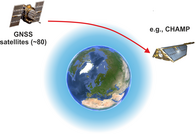During the last decade the satellite-based GPS Radio Occultation (RO) technique was established as a standard method for sounding of the global Earth's atmosphere. GNSS-RO data are mainly used to improve weather forecasts and for climate change related research [1]. Using GNSS-RO globally distributed and very precise vertical profiles of atmospheric parameters, as temperature, water vapor and also electron density in the ionosphere can be derived. Specific advantages of the method are all-weather, long term stability, global availability and high accuracy combined with high vertical resolution.
GFZ scientists provided pioneering contributions to the development of the GNSS-RO technique. A key contribution was the German CHAMP satellite mission, which was coordinated by GFZ [2]. CHAMP-RO data and corresponding analysis results were for the first time operationally provided and in 2006 the continuous use to improve global weather forecasts was started. Currently GFZ analyses the RO data from GRACE and TanDEM-X/TerraSAR-X [2, 3] in near-real time to provide the analysis results for the assimilation to global weather models of the leading centers. Additional investigations focus to Metop [4] and FORMOSAT-3/COSMIC [2]. New satellite projects with GNSS-RO components and GFZ participation are GRACE-FO, ATMOSAT, GEROS-ISS[5] and G-TERN[6].
In addition the RO data at GFZ are used for several scientific investigations, e.g., related to temperature variations in the upper troposphere/lower stratosphere (UTLS) and to tropopause dynamics for climate monitoring, to gravity waves and also to the characterization of ionospheric disturbances on a global scale [6, 7, 8, 9]. Scientists of the GNSS-RO working group are involved in several DFG research projects (GISELA, MuSe, StRATEGy) and research programmes (SPARC ATC group, Reklim).
The work of the GNSS radio occultation group at GFZ is integrated in the Helmholtz research field "Earth and Environment" in the program "Atmosphere and Climate" in close cooperation with the KIT and FZ Jülich.
[1] Anthes, R.A.: Exploring Earth's atmosphere with radio occultation: contributions to weather, climate and space weather. Atmos. Meas. Tech., 4, 1077-1103, doi:10.5194/amt-4-1077-2011, 011.
[2] Wickert, J., Michalak, G., Schmidt, T., Beyerle, G., Cheng, C. Z., Healy, S. B., Heise, S., Huang, C. Y., Jakowski, N., Köhler, W., Mayer, C., Offiler, D., Ozawa, E., Pavelyev, A. G., Rothacher, M., Tapley, B., Arras, C.: GPS radio occultation: results from CHAMP, GRACE and FORMOSAT-3/COSMIC. - Terrestrial Atmospheric and Oceanic Sciences, 20, 1, 35-50. 10.3319/TAO.2007.12.26.01(F3C), 2009.
[3] Zus, F., Grunwaldt, L., Heise, S., Michalak, G., Schmidt, T., Wickert, J. (2014): Atmosphere sounding by GPS radio occultation: First results from TanDEM-X and comparison with TerraSAR-X. - Advances in Space Research, 53, 2, p. 272-279, http://doi.org/10.1016/j.asr.2013.11.013
[4] Zus, F., Beyerle, G., Heise, S., Schmidt, T., Wickert, J., Marquardt, C.: Validation of refractivity profiles derived from GRAS raw-sampling data. - Atmospheric Measurement Techniques, 4, 7, 1541-1550. 10.5194/amt-4-1541-2011.
[5] Wickert, J., et al., GEROS-ISS: GNSS REflectometry, Radio Occultation, and Scatterometry Onboard the International Space Station, IEEE Journal of selected topics in applied Earth observations and Remote Sensing, Vol. 9, Issue: 10, p. 1_30, 10.1109/JSTARS.2016.2614428, 2016.
[6] Wickert, J./Cardellach, E. et al., G-TERN: GNSS Transpolar Earth Reflectometry moNitoring system, Proposal for an Earth Explorer 9 Mission, European Space Agency, 2017.
[7] Schmidt, T., J. Wickert, A. Haser (2010): Variability of the upper troposphere and lower stratosphere observed with GPS radio occultation bending angles and temperatures. Adv. Space Res., 46(2), 150-161, doi:10.1016/j.asr.2010.01.021.
[8] Schmidt, T., P. Alexander, A. de la Torre (2016): Stratospheric gravity wave momentum flux from radio occultations. J. Geophys. Res. Atmos., 121, doi:10.1002/2015JD024135.
[9] Arras, C., and Wickert, J., Estimation of ionospheric sporadic E intensities from GPS radio occultation measurements, Journal of Atmospheric and Solar-Terrestrial Physics (2017), doi: 10.1016/j.jastp.2017.08.006.



